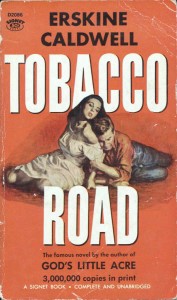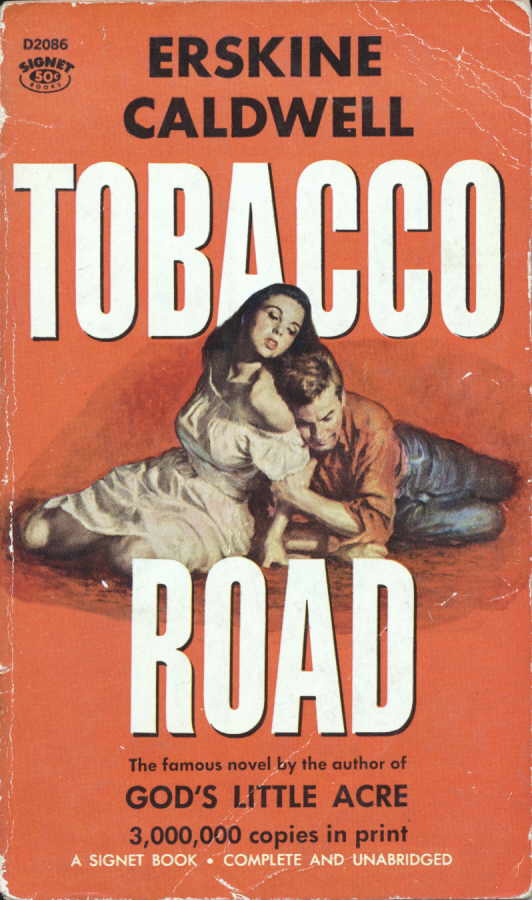 Wolfe may be right that you can’t go home again, but re-reading Erskine Caldwell’s Tobacco Road took me right back to Dr. Hitchcock’s Southern Lit class at Auburn. Caldwell’s 1932 novel portrays the life of a poor, white sharecropper family near Augusta, Georgia (which happens to be very close to my mother’s people’s land), and at the same time lays the thematic foundation for a genre that will follow.
Wolfe may be right that you can’t go home again, but re-reading Erskine Caldwell’s Tobacco Road took me right back to Dr. Hitchcock’s Southern Lit class at Auburn. Caldwell’s 1932 novel portrays the life of a poor, white sharecropper family near Augusta, Georgia (which happens to be very close to my mother’s people’s land), and at the same time lays the thematic foundation for a genre that will follow.
The Lesters’ lives are intrinsically tied to the earth, so much so that the patriarch, Jeeter, can’t consider the opportunity that could afford itself in the city, and stubbornly holds himself (and his family) to a life with no options and no hope. He has no money for seed or fertilizer, which means he has no means to create means.
When Jeeter’s son, Dude, marries the much older and widowed Sister Bessie Rice, the family is overly captivated by the automobile Bessie has the cash to buy. For the bulk of the narrative, most of the characters are focused on what will turn out to be squandered resources. Hope placed on the wrong things.
Bessie is also a minister, and plans to make one of Dude, though he has no experience up to this point. Through Bessie, Caldwell engages the theme of religion and a culture’s belief system that is so engrained in divine providence that no one questions when she shows up proclaiming that the Lord told her she should marry Dude.
Less tangible than the earth, poverty or religion – but perhaps tied up in all of them – is the sense of hopelessness, helplessness, futility – like watching a train wreck in slow motion. You see the bad and uneducated decisions coming and you tense-up, like anticipating being punched in the stomach, to see them happen, but there is just no stopping them.
But like good Southern literature, there’s a fair share of humor as well. The good and grotesque kind, that makes you laugh and cringe at the same time. Like the idea of hiding a body in a corn-crib ’cause you’d rather be off drinking than sittin’ up with it, only to have rats come eat at its face. Yeah, that kind.
So, while Caldwell’s Tobacco Road may not be the most entertaining book you’ll read all year, it is short, so it is worth picking up for the reminder of where our favorite Southern novels came from.






Comments
Powered by Facebook Comments